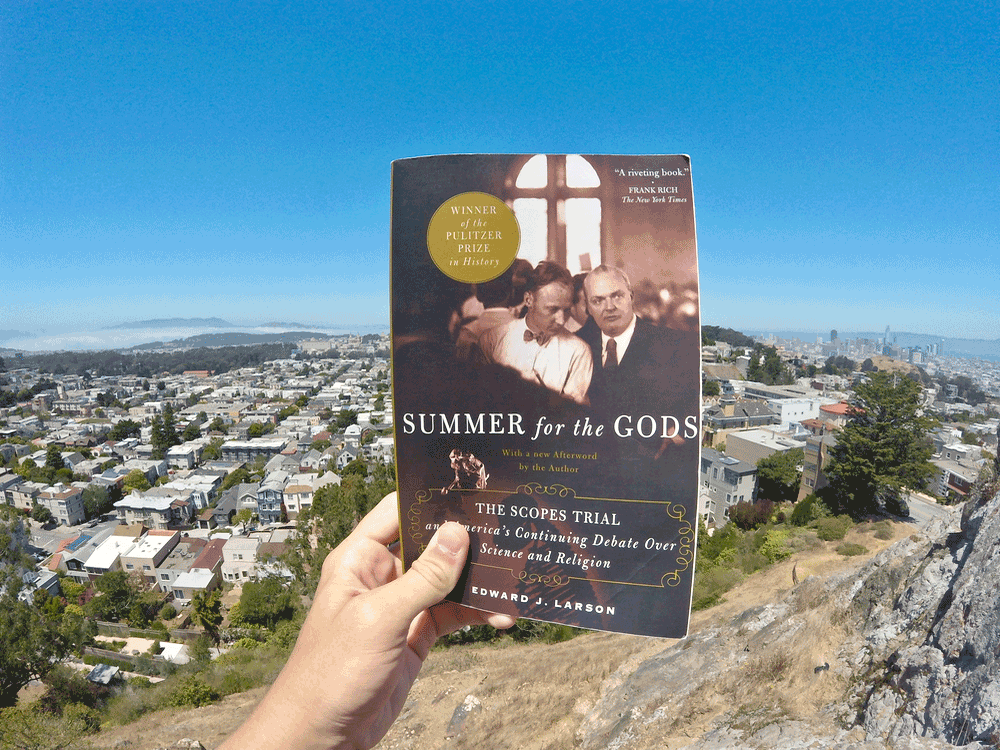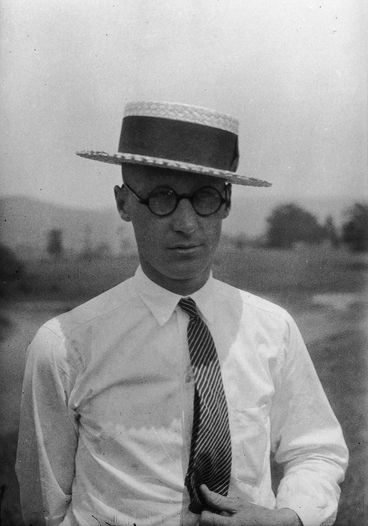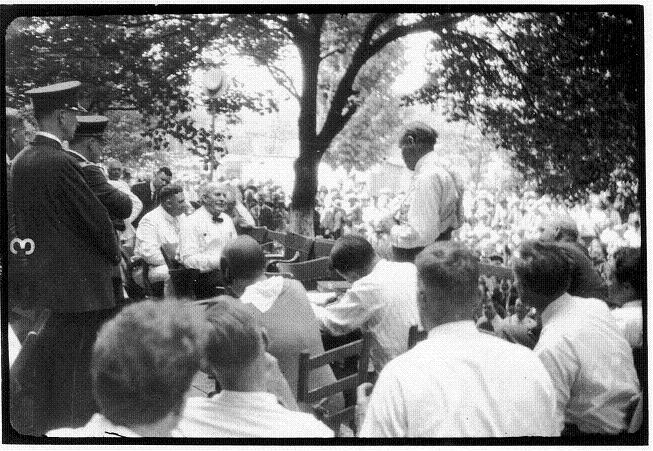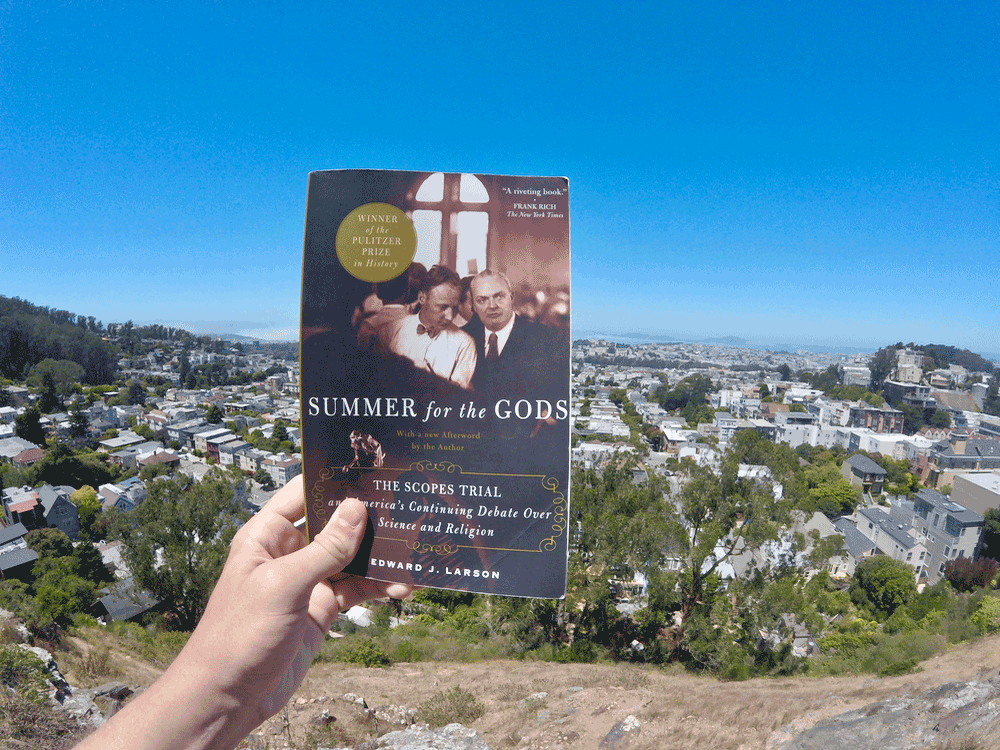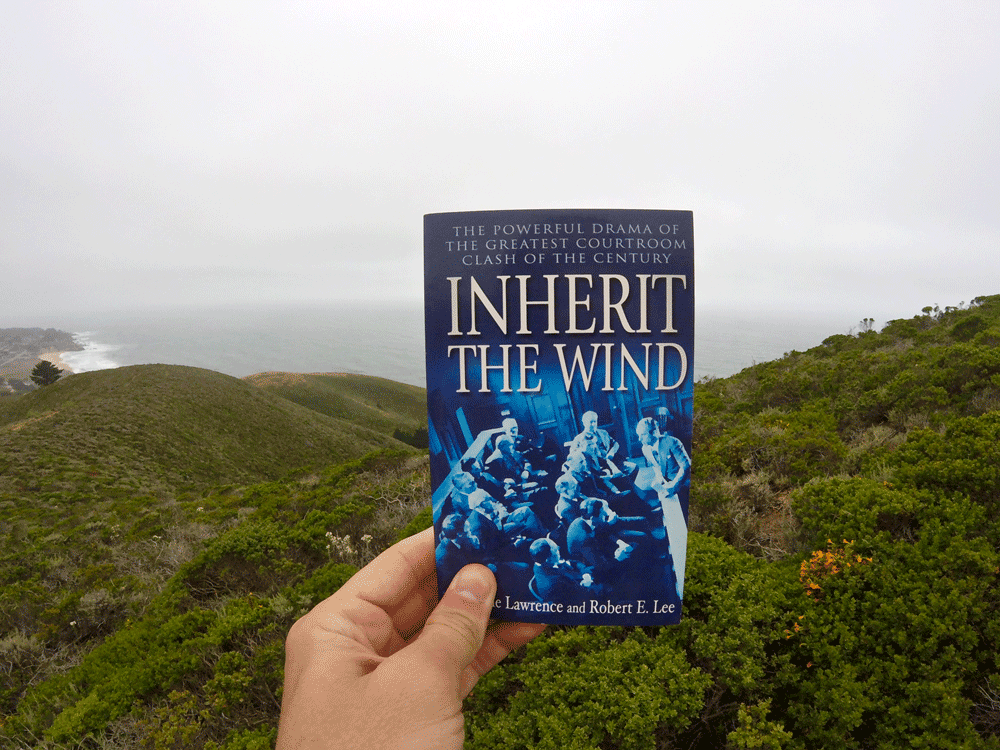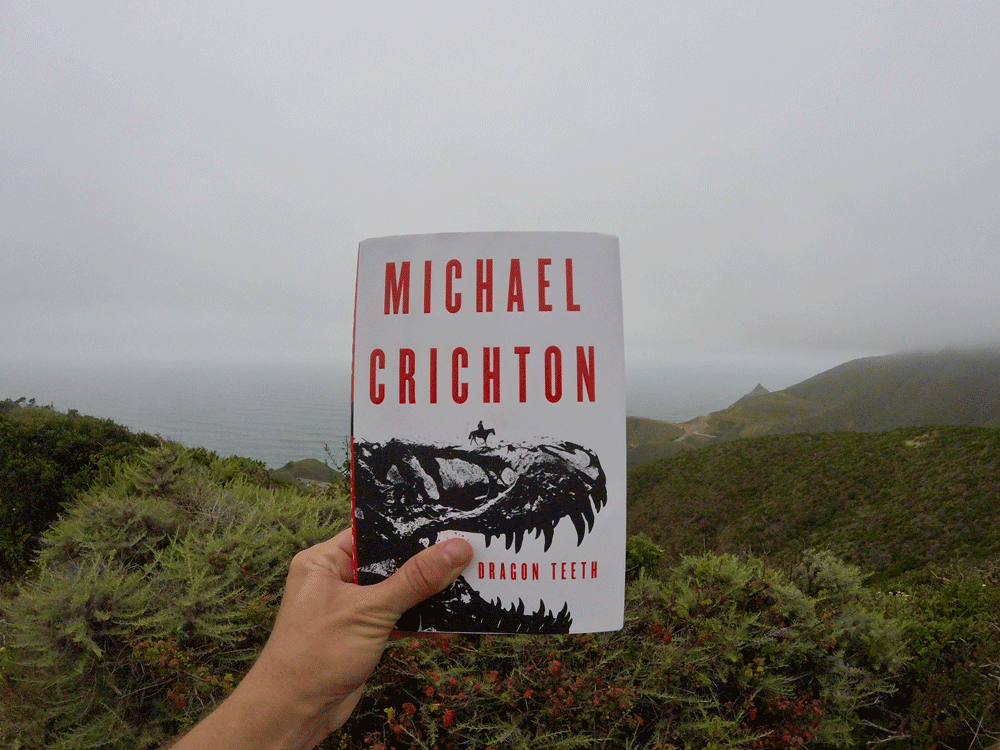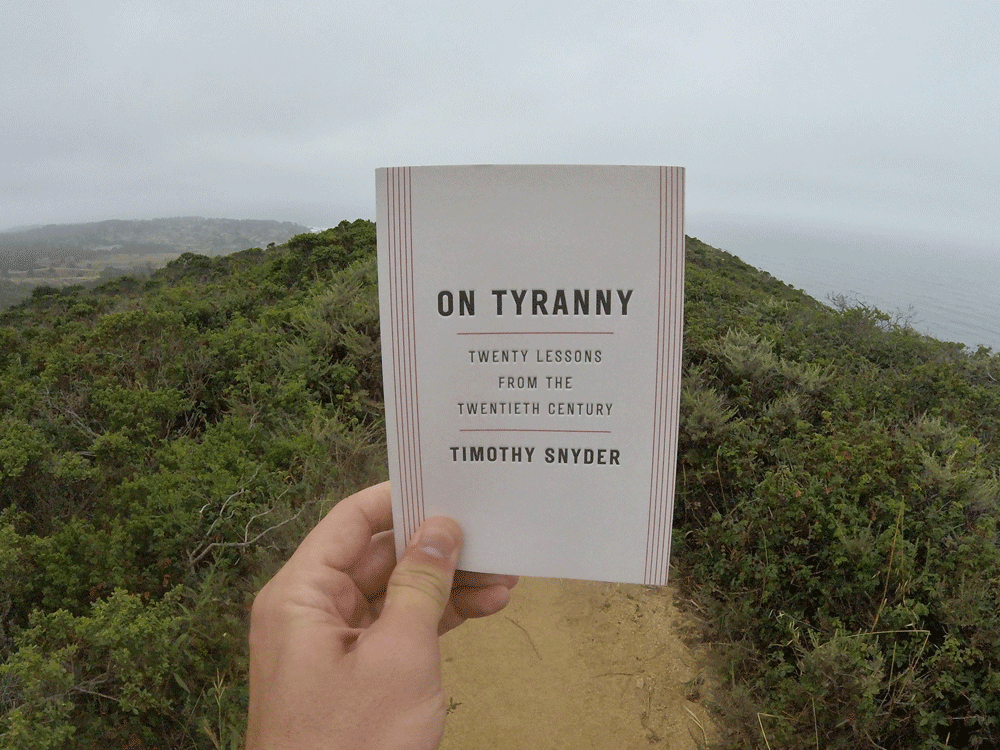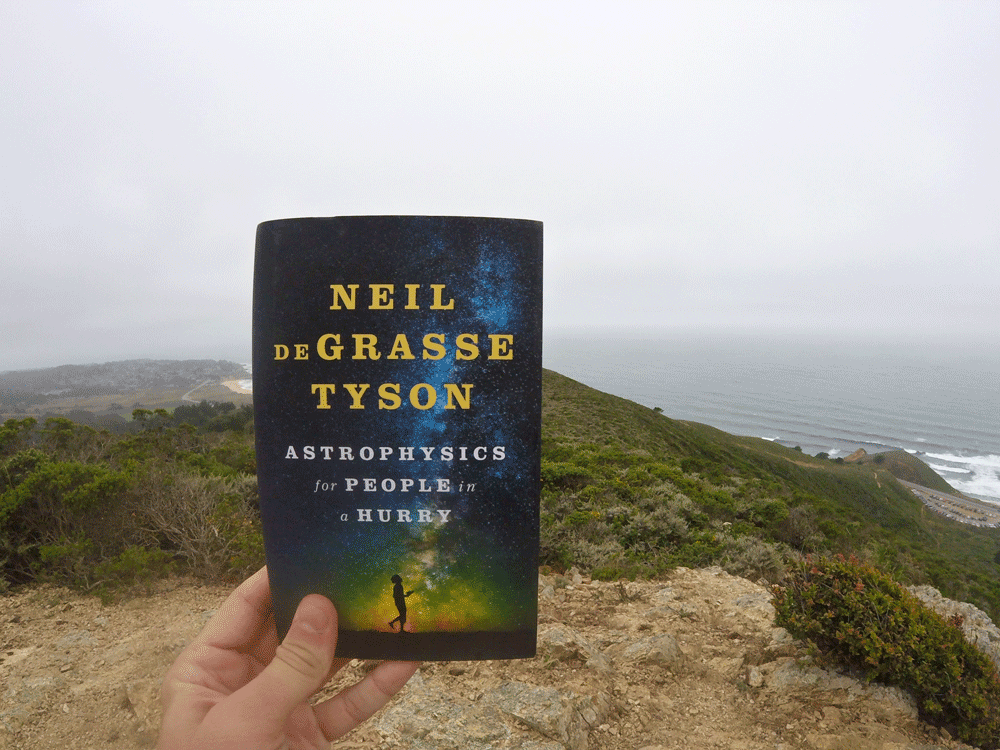" Young whippersnapper--
ought to be hanged on the spot. "
— Juror, The State of Tennessee vs. John Thomas Scopes
In Summer for the Gods, Edward J. Larson recounts one of America's most famous courtroom battles: The State of Tennessee vs. John Thomas Scopes, also known as the Scopes Monkey Trial. The year is 1925 and the sleepy town of Dayton in eastern Tennessee has suddenly become the battleground upon which science and religion square off for their place in public schools.
Local math and physics teacher John T. Scopes had disobeyed the Butler Act, which illegalized the teaching in Tennessee public schools of theories that contradicted the biblical creation story found in Genesis. This included Charles Darwin's theory of evolution, for which scientists were finding fossil evidence of across Europe. Scopes, backed by a stellar roster of lawyers with the hopes of publicizing the case, planned their defense. The opponent: William Jennings Bryan, a well-known politician and Christian thought leader. He would prosecute on Tennessee's behalf to maintain Christianity's presence in classrooms across America and keep Darwin out.
The jury took nine minutes to deliberate. But the trial took eight days. Over 3,000 locals, tourists, and journalists gathered on Dayton's courthouse lawn to witness the epic showdown—a number more than twice Dayton's population. As Clarence Darrow, the lead defense lawyer for Scopes, wrote, "All in all, that was a summer for the gods," and as author Edward J. Larson shows with a sense of drama and discerning research, its legacy is still felt 90+ summers later.
Local math and physics teacher John T. Scopes had disobeyed the Butler Act, which illegalized the teaching in Tennessee public schools of theories that contradicted the biblical creation story found in Genesis. This included Charles Darwin's theory of evolution, for which scientists were finding fossil evidence of across Europe. Scopes, backed by a stellar roster of lawyers with the hopes of publicizing the case, planned their defense. The opponent: William Jennings Bryan, a well-known politician and Christian thought leader. He would prosecute on Tennessee's behalf to maintain Christianity's presence in classrooms across America and keep Darwin out.
The jury took nine minutes to deliberate. But the trial took eight days. Over 3,000 locals, tourists, and journalists gathered on Dayton's courthouse lawn to witness the epic showdown—a number more than twice Dayton's population. As Clarence Darrow, the lead defense lawyer for Scopes, wrote, "All in all, that was a summer for the gods," and as author Edward J. Larson shows with a sense of drama and discerning research, its legacy is still felt 90+ summers later.
| Pictured: John T. Scopes, a math and physics teacher and football coach of Rhea County Public Schools in Dayton, Tennessee. Scopes agreed to work with the ACLU to test the constitutionality of the Butler Act of 1925, which forbade the teaching in Tennessee public schools of anything that contradicted the creation story of man found in Genesis. |
WHY I LOVE IT
After reading Inherit the Wind earlier this summer and rewatching this spectacular adaptation by Stanley Kramer, I wanted to dive into the history of the Scopes Monkey Trial. I was expecting to find a crystal clear, resounding victory in favor of liberalism, free speech, and scientific inquiry. The truth, at least how Larson's research presents it, contained not so much a romantic myth as a messy complexity of issues and motivations. Here are a few issues that stood out to me:
THE ACLU'S MOTIVES
Their team of lawyers, including Darrow, were in part motivated by fame, and maneuvered tirelessly to find a 'model' science teacher with whom to test the Butler Act. The acrobatic salesmanship so to speak of the lawyers is probably more a comment on the American legal system at large, but it disturbed me somewhat. Scopes was a man worthy of defending, but it seemed like to them he was also a pawn in some game.
SIDE ISSUES
The grandstanding and uncharacteristically off-topic speeches that were given by both Bryan the arch-Christian and Darrow for the defense seemed to demonstrate that this case wasn't so much about the separation of state and church or individual rights, as the validity of science and/or religion. All these side issues were muddied together into a labyrinth that wasn't really settled in Dayton or in the Supreme Court Appeal process.
PUBLIC SCHOOLING AT LARGE
I think the main reason for the muddying of issues is that the Butler Act pertains only to public schools—funded by the vague, undefined 'people' or 'society'. If this was a private school, there's no issue. Scopes' right to freedom of speech couldn't be undermined if he is censored. A private school, religious or secular or a blend, as far as I'm concerned can hire and fire and set curriculums to their liking — and I think that sentiment was shared in 1925 by most of America. Why this is a special case is that it was a state's public school. I'm a separation of state and church absolutist, but there's something to be said as well for freedom of expression of teachers — and the taxpayers who pay for salaries, the majority of whom are Christian, whose children attend state schools.
SCIENCE VS. 'SCIENCE'
Moreover, A Civic Biology, the science book used in Scopes' classroom also contained a section on eugenics, the allegedly rational study of racial groups in terms of their mental and physical abilities. Since the 1930's and '40s, it's been discredited and denounced by most of the scientific community as pseudo-science. But before then it was believed in not just by Nazis and Communists of Europe, but also by many Americans, including President Woodrow Wilson.
My point isn't that evolution is a pseudo-science. I honestly don't know enough about what Darwin and his predecessors actually theorized. I suspect though that it's caricatured by the culture at large via honest errors and dishonest smears. The point is that while science is synonymous with truth, not everything that claims to be science is true. Humans are amazingly good at tricking themselves and rationalizing. Bryan, the Christian demagogue prosecuting Scopes showed this time and again in his speeches and answers when he took the stand towards the end of the trial.
My point isn't that evolution is a pseudo-science. I honestly don't know enough about what Darwin and his predecessors actually theorized. I suspect though that it's caricatured by the culture at large via honest errors and dishonest smears. The point is that while science is synonymous with truth, not everything that claims to be science is true. Humans are amazingly good at tricking themselves and rationalizing. Bryan, the Christian demagogue prosecuting Scopes showed this time and again in his speeches and answers when he took the stand towards the end of the trial.
| Pictured: Prosecuting lawyer William Jennings Bryan seated left being interrogated by defense lawyer Clarence Darrow standing right. The proceedings had moved to the courthouse lawn where over 3,000 people watched and listened to Darrow probe Bryan's testimony of the bible. Dayton's population was only 1,500 at the time; the audience included spectators and journalists from across the country. |
ABOUT THE AUTHOR

Edward J. Larson is the author of six other books, including Evolution's Workshop: God and Science on the Galapagos Islands and The Return of George Washington: Uniting the States, 1783-1789.
Larson is a professor at Pepperdine University in California, and also retains a professorial appointment at the University of Georgia, where he's taught Law for twenty years. Also, he offers several history courses as a part of The Great Courses project.
I found on Youtube one talk Larson gave about the parallels between the 1st Presidential election in US history and the 2016 Presidential election and enjoyed it a lot.
Larson is a professor at Pepperdine University in California, and also retains a professorial appointment at the University of Georgia, where he's taught Law for twenty years. Also, he offers several history courses as a part of The Great Courses project.
I found on Youtube one talk Larson gave about the parallels between the 1st Presidential election in US history and the 2016 Presidential election and enjoyed it a lot.
FAVORITE QUOTES
5. "The modern world is the child of doubt and inquiry, as the ancient world was the child of fear and faith." — Clarence Darrow, defense lawyer of John Scopes
4. "Those who wanted to hear a great burst of oratory did not hear that. They simply saw a stooped man in baggy dark clothes who talked to them in ordinary conversational manner. They saw a tired but kindly face, shrewd eyes which often evoke laughter, but seldom laugh. And they liked it." — Journalist describing Darrow
3. "The contest between evolution and Christianity is a duel to the death. The atheists, agnostics, and all other opponents of Christianity understood the character of the struggle, hence their interest in this case From this time forth Christians will understand the character of the struggle also, Evolutionists, though admittedly in a minority, are intolerant enough to demand that the school teach their views, and their views really constitute their religion." — William Jennings Bryan, Prosecutor for the State of Tennessee
2. "They did not come here to try this case. They came here to try revealed religion. I am here to defend it, and they can ask me any questions they please." — Bryan, agreeing to take the witness stand
1. "We are marching backwards to the glorious age of the sixteenth century when bigots lighted [fires] to burn men who dared bring intelligence and enlightenment and culture to the human mind." — Darrow
4. "Those who wanted to hear a great burst of oratory did not hear that. They simply saw a stooped man in baggy dark clothes who talked to them in ordinary conversational manner. They saw a tired but kindly face, shrewd eyes which often evoke laughter, but seldom laugh. And they liked it." — Journalist describing Darrow
3. "The contest between evolution and Christianity is a duel to the death. The atheists, agnostics, and all other opponents of Christianity understood the character of the struggle, hence their interest in this case From this time forth Christians will understand the character of the struggle also, Evolutionists, though admittedly in a minority, are intolerant enough to demand that the school teach their views, and their views really constitute their religion." — William Jennings Bryan, Prosecutor for the State of Tennessee
2. "They did not come here to try this case. They came here to try revealed religion. I am here to defend it, and they can ask me any questions they please." — Bryan, agreeing to take the witness stand
1. "We are marching backwards to the glorious age of the sixteenth century when bigots lighted [fires] to burn men who dared bring intelligence and enlightenment and culture to the human mind." — Darrow
"All in all, that was a summer for the gods."
— Clarence Darrow
YOU MAY ALSO LIKE

